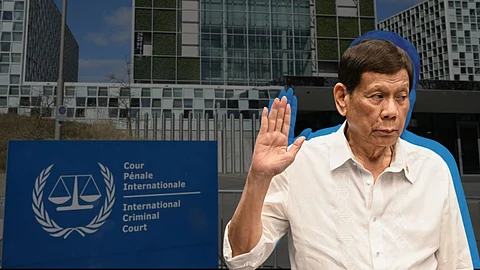
- NEWS
- the EDIT
- COMMENTARY
- BUSINESS
- LIFE
- SHOW
- ACTION
- GLOBAL GOALS
- SNAPS
- DYARYO TIRADA
- MORE

Former president Rodrigo Duterte made his first appearance before the International Criminal Court (ICC) on 14 March, where the pre-trial chamber focused on confirming his identity.
While some of Duterte’s supporters have argued that Philippine laws should take precedence, international law expert Atty. Rodel Taton emphasized that it is the ICC’s legal framework — not domestic laws — that will govern the case.
"In the ICC proceedings, international law will prevail, not domestic or national laws." Atty. Taton explained in an interview with dzBB on Saturday.
Despite the Philippines’ withdrawal from the Rome Statute in 2019, Atty. Taton clarified that the ICC retains jurisdiction because the alleged crimes occurred while the country was still a State Party.
"There are crimes mentioned that date back to when he was still the mayor of Davao up to his presidency, considering the material period in which jurisdiction is being assessed — specifically, the time when the Philippines was a member of the ICC." he said.
According to the ICC, the Philippines formally withdrew from the Rome Statute on 17 March 2018, under Duterte’s administration. However, under Article 127 of the Statute, the withdrawal only took effect on 17 March 2019. Since the ICC began its investigation before the withdrawal became official, the case remains valid.
Duterte faces crimes against humanity charges for at least 43 killings, including:
19 murders allegedly carried out by the Davao Death Squad (DDS) between 2011 and 2016 while Duterte was Davao City mayor.
24 killings allegedly linked to police and other law enforcement units across the Philippines between 2016 and 2019, during his presidency.
Atty. Taton stressed that the 14 March hearing was only procedural, focused on confirming Duterte’s identity. The next critical phase will take place in September, when the ICC will determine whether the charges have sufficient legal grounds to proceed to trial.
“At the next ICC hearing, there will be a confirmation of charges. If there is a reasonable probability that the crime occurred and the case proceeds to trial, the next hearing will be held for that process,” Atty. Taton explained.
At this stage, the ICC may either:
✔ Dismiss the case if there is insufficient evidence.
✔ Proceed to trial, officially making Duterte an accused.
“The tribunal can either dismiss the case or decide to proceed to trial. Only at that point will former President Duterte be considered an accused. For now, he is still regarded as a suspect,” he added.
If the case proceeds to trial:
Trial Phase: Before three ICC judges, the Prosecution must prove guilt beyond a reasonable doubt. Judges consider all evidence before issuing a verdict.
Sentencing: If convicted, Duterte could face up to 30 years of imprisonment — or a life sentence under exceptional circumstances.
Acquittal: If there is insufficient evidence, the case is closed, and the accused is released.
If convicted, both the victims and Duterte can appeal the verdict or sentence.
Five ICC judges in the Appeals Chamber (different from the Trial judges) will review the case.
The Appeals Chamber can uphold, amend, or reverse the decision.
If a retrial is necessary, the case goes back to the Trial Chamber.
If convicted, Duterte would serve his sentence in one of the countries that have agreed to enforce ICC rulings. If the Appeals Chamber overturns the verdict, he would be released.
